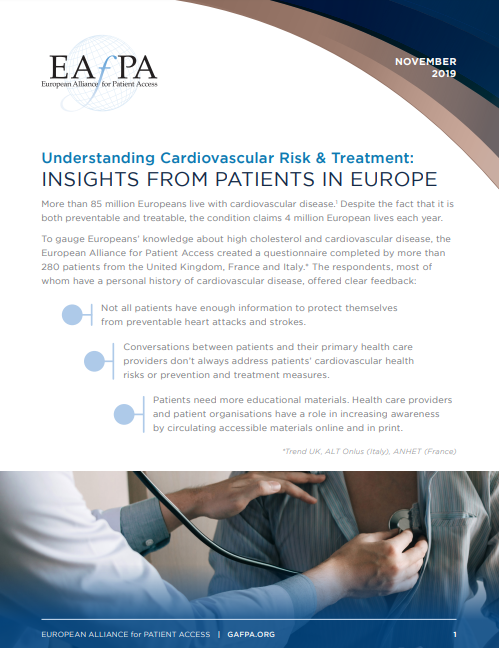
The questionnaire, completed by more than 280 cardiovascular disease patients, explored patients’ understanding of cardiovascular risk and treatment. It was developed by the European Alliance for Patient Access.
Results indicated:
People with personal cardiovascular disease experience have a high level of knowledge about cardiovascular disease risk factors and their family health history. That may not, however, reflect the awareness level of the general population.
Time-strapped physicians may not be answering all patients’ questions. Respondents indicated that “conversations between patients and their primary health care providers don’t always address patients’ cardiovascular health risks or prevention and treatment measures.” Approximately half of respondents felt their health care provider is “very stretched.”
More patient education and educational materials are needed. Just 28% of patients indicated their primary health care provider has shared educational resources to help them understand more about cardiovascular health. And nearly 93% of respondents said patients “need more materials about managing cholesterol and cardiovascular health.”
Patient organisations have a role in patient education. Patient organisations can develop and circulate accessible materials online and in print, respondents agreed.
Earlier this week, several patient advocacy organisations, including the European Alliance for Patient Access, issued a consensus statement to take action on the key messages of the new European Atherosclerosis Society/European Society of Cardiology guidelines. If patients’ questionnaire responses are any indication, Europeans are ready for educational materials and initiatives that can help increase their knowledge – and decrease their risk – of cardiovascular disease.
Recent Posts

Global Alliance for Patient Access
© 2024 GAfPA. All Rights Reserved
| Cookie | Duration | Description |
|---|---|---|
| cookielawinfo-checkbox-analytics | 11 months | This cookie is set by GDPR Cookie Consent plugin. The cookie is used to store the user consent for the cookies in the category "Analytics". |
| cookielawinfo-checkbox-functional | 11 months | The cookie is set by GDPR cookie consent to record the user consent for the cookies in the category "Functional". |
| cookielawinfo-checkbox-necessary | 11 months | This cookie is set by GDPR Cookie Consent plugin. The cookies is used to store the user consent for the cookies in the category "Necessary". |
| cookielawinfo-checkbox-others | 11 months | This cookie is set by GDPR Cookie Consent plugin. The cookie is used to store the user consent for the cookies in the category "Other. |
| cookielawinfo-checkbox-performance | 11 months | This cookie is set by GDPR Cookie Consent plugin. The cookie is used to store the user consent for the cookies in the category "Performance". |
| viewed_cookie_policy | 11 months | The cookie is set by the GDPR Cookie Consent plugin and is used to store whether or not user has consented to the use of cookies. It does not store any personal data. |